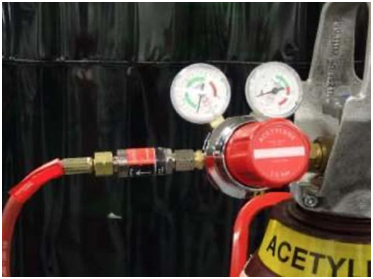


Due to the occurrence of incidents and potential for explosions involving the use of incompatible regulators with acetylene gas, the British Compressed Gases Association (BCGA) has issued a revision to Safety Alert 01 – The hazards of using incompatible regulatory with acetylene.
Due to its flammable nature, acetylene – commonly used in welding and cutting – has the potential to cause an explosion when utilised with an unsuitable regulator. To mitigate possible disaster, the manufacture of gas regulators should feature a bespoke design involving materials compatible with the specific gas.
The use of unsuitable regulators for acetylene is not only dangerous but also constitutes an illegal practice. A regulator not designed for the use with the specific gas will result in the outlet pressure not being correctly regulated. Anything exceeding 1.5 bar for all inlet pressures violates the legal requirement for compliance with legislation for the use of acetylene.
When manufacturers design regulators, the process adheres to certain standards as certain gases may react when exposed to various materials. Acetylene is sensitive to a range of materials including copper, silver, zinc, and mercury. In damp conditions, copper reacts with acetylene to form copper acetylide, an impact explosive.
Standards set by the BCGA dictate that any contact between acetylene and copper, brass (contains copper), and any other potential reactionary material, is limited.
Another reason for using an appropriate regulator is that acetylene can decompose in certain conditions, specifically when experiencing a flash back from welding or cutting equipment, or by exposure to intense heat. An acetylene regulator is stronger than most other regulators and is designed to be able to withstand an acetylene decomposition.
In addition to general safety requirements, The Acetylene Safety (England and Wales and Scotland) Regulations 2014 deem it a legal requirement to fit components, including regulators, which are specifically designed and constructed for use with compressed acetylene.
When selecting and fitting regulators, the regulator should be certified to a recognised standard for the gas service, such as BS EN ISO 2503 or BS EN ISO 7291. LPG regulators should meet BC EN 16129.
As well as being mounted in its recommended orientation, the regulator should also be clearly marked for us with the appropriate gas and should not be used outside of its life period (usually five years). Guidance on date marking is available in BCGA TIS 18.